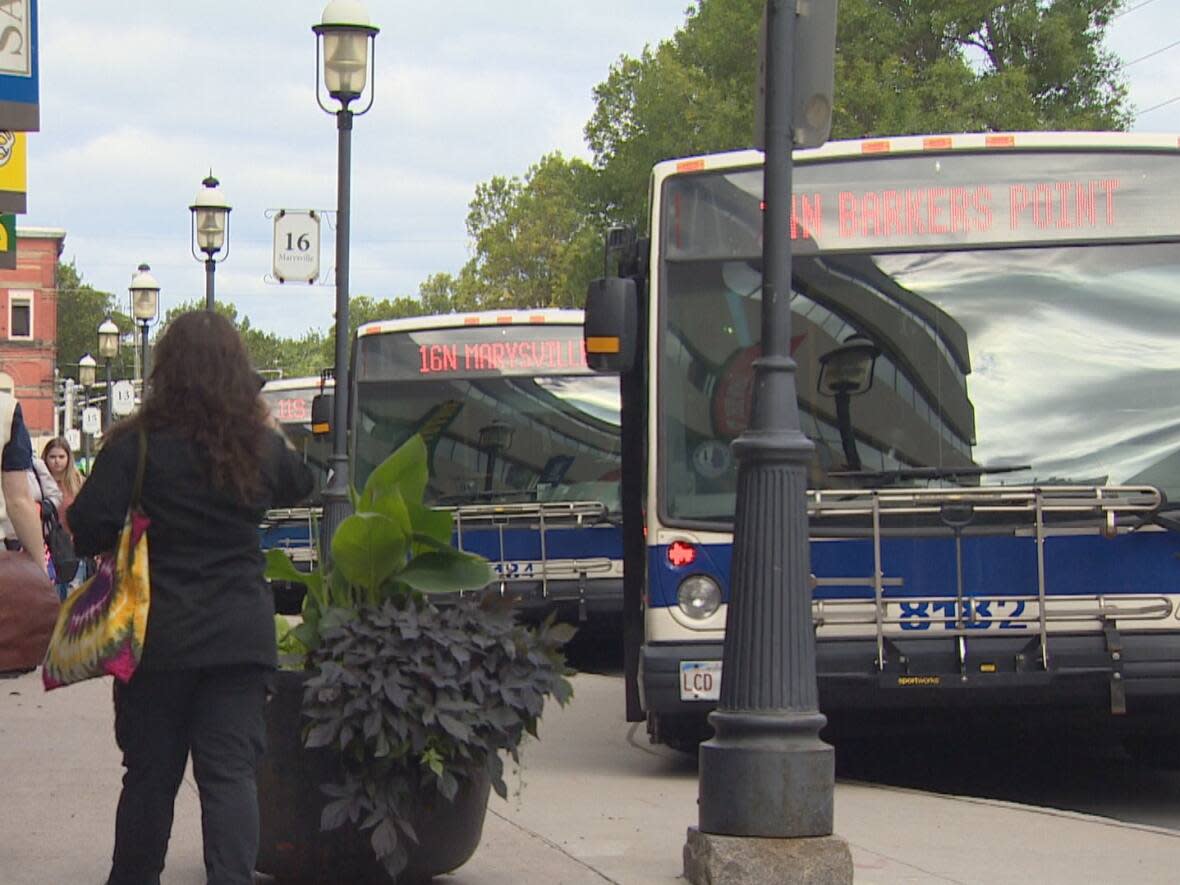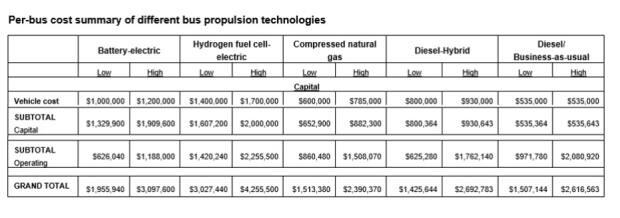Fredericton to begin replacing transit fleet with hybrid buses on road to zero emissions

The City of Fredericton says it's transitioning its buses toward being green, but isn't totally done with diesel just yet.
Fredericton Transit is beginning its "slow transition" toward zero emissions by committing to no longer purchase any buses that are powered solely by diesel, said Scott Brown, manager of building and fleet services for the city.
In their place, Brown said the city will be purchasing diesel-electric hybrid buses, which have shown to emit between 35 and 40 per cent fewer greenhouse gases than the buses currently on the road.
"No upfront facility modifications [will be required], so it's a low risk and financially prudent transition," said Brown, during a presentation at a recent mobility committee meeting.
The move is one of the first major steps by the city's transit division in the municipality's overall goal of cutting its carbon emissions by 50 per cent by 2030, and entirely by 2050.

Brown said the use of hybrid buses will give Fredericton Transit staff time to learn from other municipalities already adopting fully electric buses before deciding whether to bring them on board once the hybrid buses reach their expected end of life, within 15 to 18 years.
"This will be a slower transition, but we know we have to start moving toward those targets," said Brown, without mentioning how soon the city plans on purchasing its first hybrid bus.
Transit authorities across Canada have taken steps in recent years to replace their fleet of buses with those that either burn less fossil fuel, or none at all.
In New Brunswick, the City of Saint John put its first full-size electric bus on the road in July and is leasing six smaller electric buses to use as part of a new on-demand service. The city's ultimate goal is to electrify its entire fleet by 2040.
CBC News asked the City of Fredericton when it expects to purchase its first hybrid bus and how much it expects to spend on greening its fleet by 2050.
Brown, in an email, said there's no timeline for purchasing hybrid buses but, depending on funding opportunities, might buy one in 2023 or 2024.
He said a timeline on adopting electric buses hasn't been determined yet either, noting that doing so will depend on "transit service delivery" and technology advances.
"As far as budgeting, all 28 buses will need to be replaced (at least once) by 2050," he said. "To predict what costs will be is difficult let alone trying to predict what those costs will be almost 30 years from now. As technology evolves, likely pricing will also change."
Cost analysis for Fredericton
Brown's presentation to councillors was largely drawn from the results of a study it commissioned Stantec Inc. to undertake on how Fredericton could move away from using fossil fuels for its 28-bus transit fleet.
The study examined four alternative bus types, including the hybrid buses the city went ahead with and the electric buses currently being adopted by other transit authorities.
The third option was hydrogen-fuel-cell electric, which was less attractive as the technology is newer and hydrogen production in the region is still years away. The fourth option was compressed natural gas, which was also seen as less attractive as the technology is newer and it wouldn't qualify as a zero emissions option.

The current diesel buses each cost about $535,000 with an annual $2 million operating cost. A hybrid bus could cost as much as $930,000 to purchase and as much as $1.7 million annually to operate, while an electric bus could cost as much as $1.2 million to purchase and $1.18 million to operate annually.
Federal money on the table
Fredericton's transition to diesel-electric hybrid buses is one that was made by many larger municipalities a decade ago, said Josipa Petrunic, president and CEO of the Canadian Urban Transit Research and Innovation Consortium, which advises municipalities on how to move their transit fleets away from fossil fuels.
She said many of those same municipalities are now transitioning their fleets to electric buses, with help from Infrastructure Canada's $2.75 billion fund for zero-emission public transit and school buses.

"That means if Fredericton's moving to diesel-electric, it won't qualify for any federal money as an offset, and that federal money is substantial," Petrunic said.
"If you think about a battery electric bus is a million dollars, the federal government will cover 50 per cent, making it $500,000. That's less expensive than a diesel-electric bus, which it will not cover."
Petrunic added, however, that going electric isn't as simple as just buying the buses.
On top of the facility upgrades to install charging stations at the bus depots, the city will likely have to install chargers along bus routes to keep them going for their full scheduled run.
"All that adds cost and complexity and is about a 10 year to 15 year cycle from the time you decide that that's the pathway you're taking."


